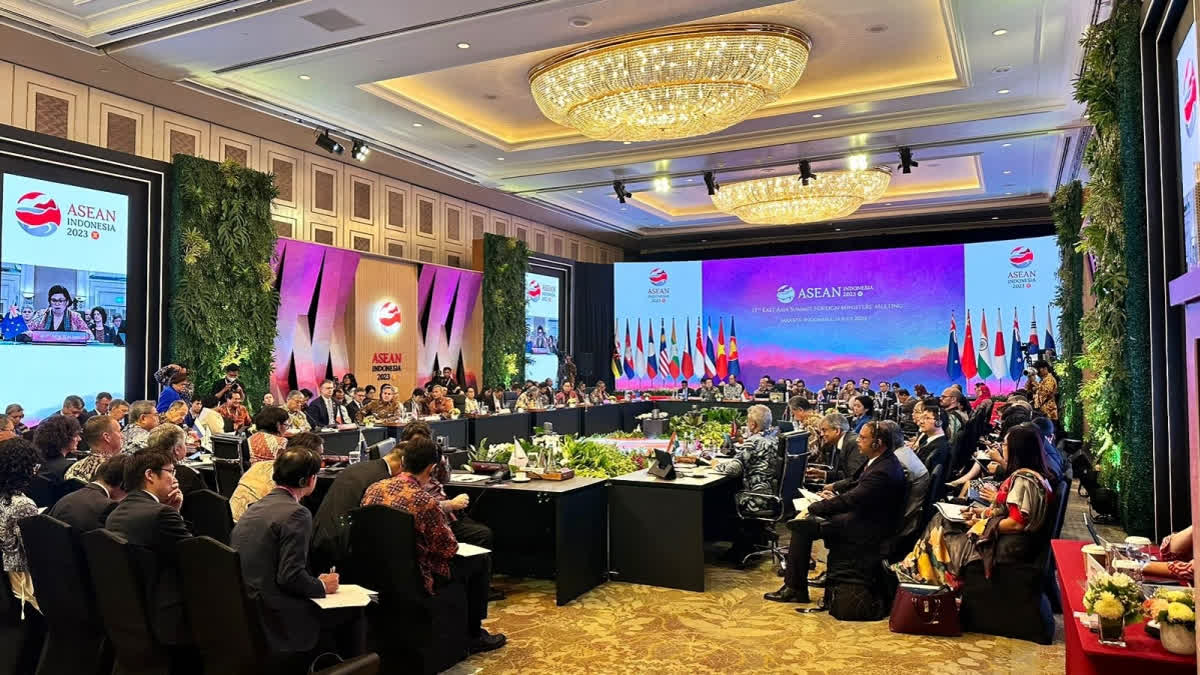New Delhi: "The Indo-Pacific is not a battleground. This region must remain stable," said Indonesian Foreign Minister Retno Marsudi during the opening of the East Asia Summit (EAS) Foreign Ministers' Meeting in Jakarta on Friday.
The EAS consists of 18 member countries, including ASEAN members and their partners such as the United States, China, Russia, Japan, India, Australia, Korea, and New Zealand. The EAS serves as an inclusive platform to discuss the dynamics in the region and the world.
Foreign Minister Retno further stated that people have high expectations from the EAS as it is the only forum that involves all key players in the Indo-Pacific region. "Currently, the Indo-Pacific is at a crucial moment," he said.
Also read: EAM Jaishankar calls on Indonesia's President Joko Widodo
According to Marsudi, Indo-Pacific needs to stay a peaceful region, as it is home to 60 percent of the world's population and the biggest contributor to the global economy over the next three decades. "This region will be the largest contributor to global economic growth in the next 30 years. Significant developments in technology, medicine, and renewable energy are happening every day", she said.
"However, we are still very far from ensuring a conducive environment to unlock the full potential of our region. Mistrust and uncertainties still exist. Some say the Indo-Pacific is experiencing symptoms of 'Cold War in Hot Places,” said the Indonesian Foreign Minister.
She pointed out that in addition to being a net contributor to economic growth, the Indo-Pacific must also be a net contributor to peace and spread the paradigm of collaboration to other regions. "The EAS must contribute to realizing the collective aspirations of a peaceful, stable, and inclusive region," the Minister added.
The Indonesia Foreign Minister urged all parties to work together to bridge differences, foster trust, and build an inclusive regional architecture. "The existing differences should not be divisive but rather enrich collective efforts and become sources of strength," she added.
The Foreign Minister cited the philosophy of 'Bhinneka Tunggal Ika,' which means unity in diversity, as a principle that emphasises how harmony can be achieved through embracing differences to realise common goals. "This spirit needs to be embraced by all EAS participants in their discussions and by listening to each other without prejudice," she added.
"We are in this train of EAS. Everyone is welcome aboard," she quipped. Meanwhile, in Indonesia's national statement, the Foreign Minister emphasized two points - first appreciation for the support and respect for ASEAN's centrality. A united ASEAN (ASEAN that matters) will bring benefits not only to the region but also to the world. Second, a call to EAS member states to ensure the success of the upcoming East Asia Summit in September. The Indonesia Foreign Minister urged all parties to "build bridges" and bring together existing differences.
During the meeting, the ASEAN Secretary-General highlighted that cooperation within the EAS framework continues to strengthen, particularly in areas such as green energy, environment, education, health, trade, food security, maritime security, and marine conservation.
Also read: EAM Jaishankar meets counterparts from ASEAN grouping in Indonesia
The meeting discussed the dynamics in the region and globally, including efforts to promote peace in Ukraine, respect for international law in the South China Sea, stability on the Korean Peninsula, and the resolution of the Myanmar issue. The meeting emphasized the crucial role of the EAS as a platform for cooperation and dialogue in promoting stability, peace, and prosperity in the region. Broad support was given to ASEAN's centrality, the implementation of the ASEAN Outlook on the Indo-Pacific, and the implementation of the Five-Point Consensus in addressing the Myanmar issue.
Union External Affairs Minister Dr. S Jaishankar also spoke at the 13th East Asia Summit Foreign Ministers meeting and noted that the regional forum must be committed to a free, open, inclusive, and rules-based Indo-Pacific, with respect for sovereignty and territorial integrity.



